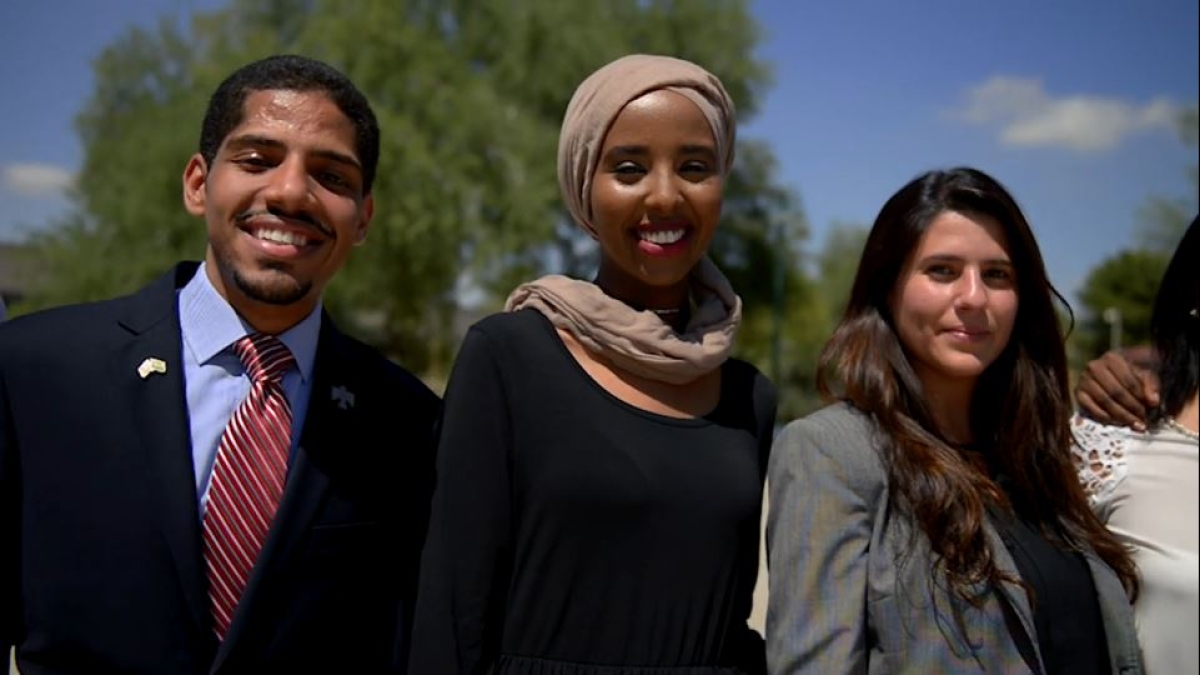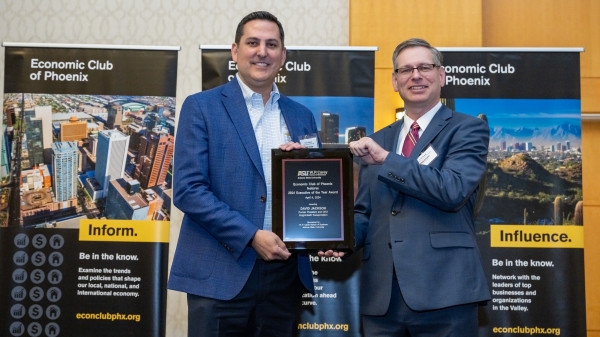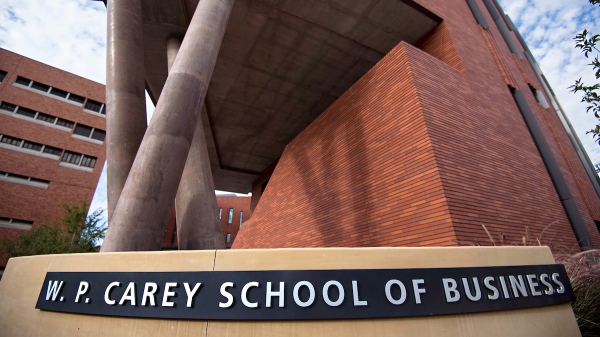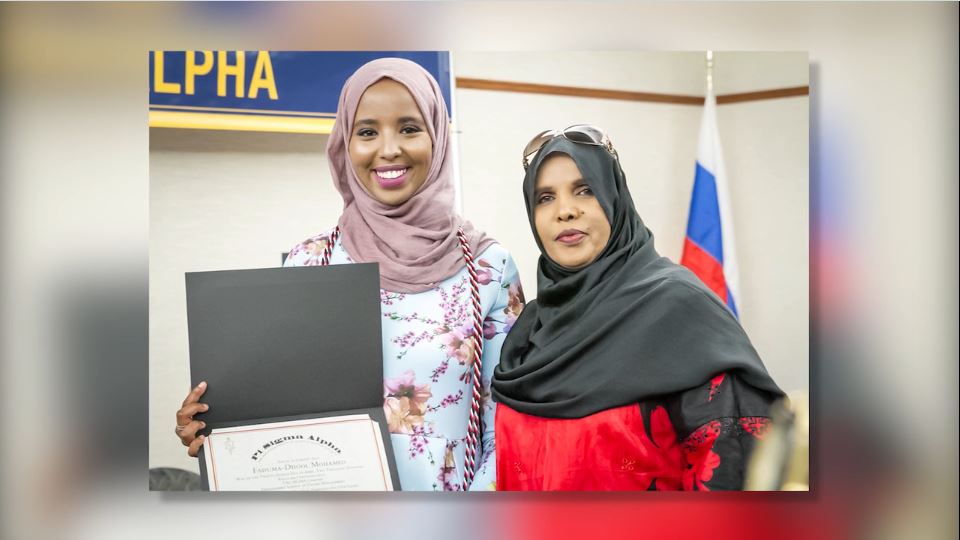ASU Thunderbird student carries many homes in her heart

Faduma-Dhool Mohamed (center) '17, Master of Arts in Global Affairs and Management, Somalia/Kenya
This profile is part of a series highlighting the personal stories and achievements of Thunderbird students. Ready to read more? Subscribe to the Knowledge Network newsletter.
Even amid the rich diversity at Thunderbird School of Global Management, Faduma Mohamed stands out: She was born in the United States to Somali parents but raised entirely in Kenya. As a result, Faduma speaks fluent English, Swahili, Somali and “a bit of Arabic.”
“Kenya is my home — my friends and family members still live there. But because of my parents, I am 100 percent Somali, and that’s my culture. My American identity is something I’m still discovering since I came to Thunderbird,” she said. “I was raised with a multicultural background — there was diversity even within our house. So that’s something I appreciate.”
Faduma said people often find her background intriguing or even confusing. “But I grew up with it, so it’s normal to me,” she said. “With Kenya, we have so many tribes, and each tribe has their own culture, language and food delicacy.”
“So I appreciate where I come from and my Somali blood, but at the same time I appreciate the country that I am in.”
‘Use business to do good’
Faduma came to Thunderbird to “find ways to use business to do good,” she said, and her childhood in Kenya offered an early glimpse of the path she would later choose.
“Growing up, I always had a passion and interest in helping people. I remember as a kid, it was as simple as collecting money and giving it to the street children anytime I’d see them,” she said. “As I grew up, the ways I’d help people matured, and I increased my thinking outside the box.”
In high school, for example, Faduma launched a fundraising campaign to create “Kindness Kits” that provided basic essentials for orphans. She was overwhelmed by the support it received and the number of people who got involved.
“It helped me realize that people want to do good if you just give them an opportunity,” she said. “People want to help but don’t know how or who to contact. Sometimes you have to be that person, step up and put that idea out there.”
“People want to do good if you just give them an opportunity. Sometimes you have to be that person, step up and put that idea out there.”
Faduma said her passion for helping people “has always been with me — I think that comes from my parents. Especially my mom.”
Her mother was born and raised in Somalia but moved to Kenya during a period of civil war in the 1990s. Kenya is also where her mother and father met.
“Coming from a war-stricken country that’s affected by poverty and unemployment, my mother always had that sense of giving back to her country. She had family members still back in Somalia,” Faduma said. “So my mom instilled that value in me.”
It would be another four years before she applied. Faduma wanted more work experience, so after a brief stint at an international bank, she moved into the environmental services industry and worked with a company that sold solar energy panels, water sanitation and environmentally friendly products.During her undergraduate business studies in Kenya, Faduma first learned about Thunderbird, but not from a recruiter or a professor. Her uncle had recently attended Thunderbird through an executive program with Intel: “He told me all about it and he said, ‘If you want to do your master’s degree, Thunderbird is the place for you.’”
Thunderbird ‘a perfect mix’
“That was a great experience because I was young and it was a mid-sized company, so there was a lot of room for me to grow within the company,” she said. “I gained a lot of responsibility and experience that helped when I came to Thunderbird. During class discussions, for example, I could share my experiences. Or I could get input from professors about how I could take that experience further.”
“That’s why Thunderbird was such a perfect mix for me,” she said, “because it has that global affairs aspect of business. It’s a place where I could leverage my business degree and my work experience and then do something that I’m passionate about.”
“When I got here, I immediately started working with Thunderbird for Good.
They have programs that train women entrepreneurs from all over the world, empowering them to run their own businesses. And so working with them has definitely opened my eyes to how you can combine both.”
‘We get each other’
Faduma said she loves learning from Thunderbird professors because they reach beyond business theory to include experiences in the field. “I’m so glad I’ve had a chance to learn from them but also to chat with them outside of the classroom and have them as mentors.”
Her fellow students are also a source of learning and inspiration, Faduma said.
“In my class, we had so many different backgrounds. In terms of culture, of course, but also in terms of undergraduate degrees, people with lots of experience or little-to-no experience. But everyone has worked at some point in their life,” she said. “We all have different ways of thinking, and you see that in the classroom discussions or group projects. That’s better than thinking in just one direction. We realize that none of our experiences are superior to the other.”
Long after Faduma has left Thunderbird, these people and relationships will still leave a lasting impact, she said: “That’s something I heard over and over from alumni, and it’s true. Thunderbird is such a unique place. I think the fact that we students are so different but we share so many commonalities, that makes it much stronger. We get each other.”
Faduma graduated in May, but her goal is to gain more international experience before heading home to make an impact in Kenya.
“How I see myself in the future of Kenya, and also Somalia, is to make them a better place for youth and for disadvantaged communities. And to use business to do that, because business is powerful,” she said.
“Being independent, making your own money — that’s a gift that anyone would be forever thankful for. Helping or giving aid is one thing, but what if you can teach someone how to start their own business and provide for themselves and their families?”
“That’s priceless, and that’s something I want to take back home — to both of my homes.”
More Business and entrepreneurship

5 easy ways to improve your focus
Editor's note: This story originally appeared in the summer 2024 issue of ASU Thrive magazine. Do goldfish really have a longer…

Honoring homegrown leadership
When Phoenix native David Jackson was a finance student at Arizona State University’s West Valley campus, he gave separate…

Multiple ASU MBA programs rank among best in country
In the U.S. News & World Report's 2024 Best Business Rankings, the W. P. Carey School of Business at Arizona State University…
